Iftar in Dubai: A Culinary Exploration of Tradition
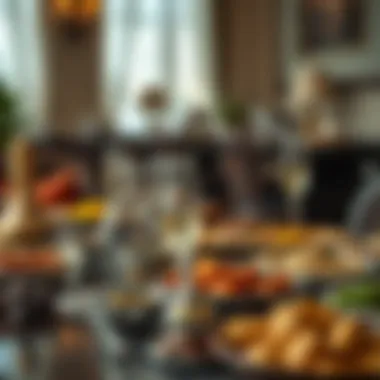
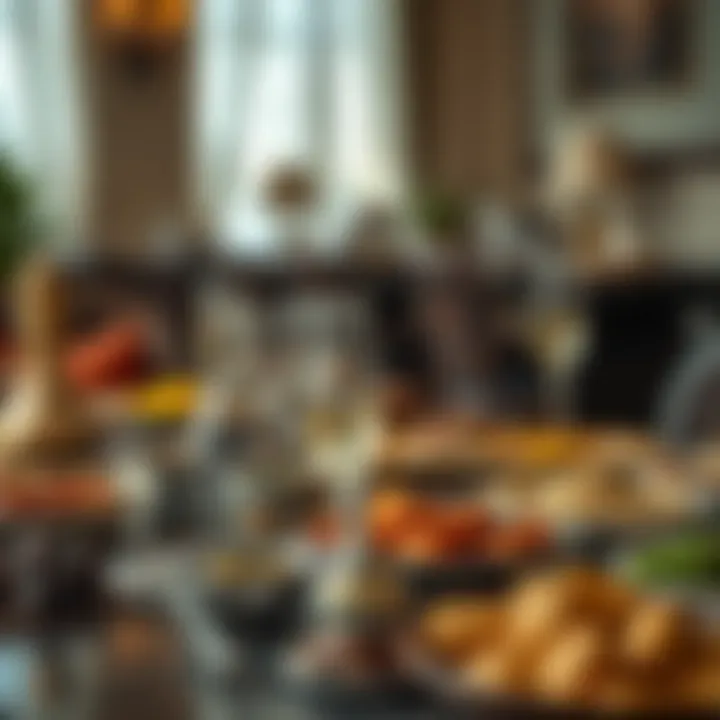
Intro
As the sun dips below the horizon, a distinct energy fills the air in Dubai, marking the beginning of iftar— a beloved tradition during the month of Ramadan. Each day, as the call to prayer resonates across the city, an exhilarating wave of anticipation surges among both locals and expats. Iftar is not merely a meal; it's a communal celebration steeped in history and enriched by a melting pot of cultures that defines Dubai.
In this culinary journey, we will peel back the layers of iftar, exploring its significance in modern Dubai, the variety of flavors that grace the tables, and the profound sense of community that accompanies this cherished ritual. This isn’t just about what’s on the plate—it’s about the rituals, the ambiance, and the shared moments that stitch together the social fabric during Ramadan.
From sumptuous spreads featuring humble ingredients transformed into gourmet dishes to intimate gatherings in vibrant restaurants, this article touches upon the culture and culinary offerings that have evolved over the years. Through various lenses—historical context, community connections, and popular dining spots—we aim to illuminate the experiences that make iftar in Dubai a remarkable part of life in the emirate.
As we dive deeper, expect to find insights tailored for everyone, be it residents seeking new dining experiences or visitors eager to experience the warmth of Dubai's communal spirit during this special time.
Understanding Iftar
Iftar marks more than just a meal; it represents the essence of community, culture, and tradition during Ramadan in Dubai. As the sun slips behind the horizon, Muslims around the world eagerly await this moment to break their fast. In Dubai, iftar is a vibrant spectacle, interweaving diverse cultures and culinary traditions into a rich tapestry of flavors and experiences.
From a cultural standpoint, iftar strengthens bonds among families and friends, gathering people from various backgrounds to share a moment of gratitude. This act extends beyond mere sustenance; it fosters a sense of belonging and connection.
Cultural Importance of Iftar
The cultural significance of iftar cannot be overstated. It's a time when individuals come together, showcasing the spirit of hospitality that defines Emirati society. Communities pull together in these moments, uniting to enjoy the traditional meal. Various local customs accompany this event, from sharing dates and water to the communal practice of breaking bread.
Moreover, the diversity in Dubai enhances the experience. As different nationalities settle in this cosmopolitan city, the iftar table expands to include dishes from Persia, South Asia, and beyond. Food is not just nourishment; it’s a representation of heritage and a medium through which stories are passed down.
Historical Roots of Ramadan
To truly understand iftar in Dubai, one must delve into the historical roots of Ramadan itself. This holy month marks a period of deep reflection, compassion, and spiritual renewal for Muslims. Ramadan recalls the Quran's revelation to Prophet Muhammad, which forms the bedrock of Islamic teachings. It is a time designed for the soul's purification and the promotion of empathy, especially towards the less fortunate.
Historically, the practice of fasting can be traced back through the annals of many religions. However, in the Islamic tradition, it carries unique nuances. The connection to faith, discipline, and community builds upon centuries of ritual. In Dubai, it reflects both the city's rich heritage and its forward-looking nature. The essence of iftar encapsulated in Dubai today embraces a blend of authenticity and innovation, ensuring that age-old traditions continue while also evolving in contemporary society.
The significance of iftar isn't just a personal journey; it transcends individual experiences, merging them into a collective narrative that binds the community during Ramadan.
In this light, understanding iftar is not merely about the meal itself, but an exploration into the cultural framework and historical context that enhances it. Recognizing these dimensions allows both locals and newcomers to engage more deeply with this vital aspect of life during Ramadan in Dubai.
Modern Practices of Iftar in Dubai
Modern practices of iftar in Dubai form a vibrant tapestry interwoven with cultural significance and contemporary sensibilities. The way iftar is observed today reflects both traditional roots and the diverse influences of the city’s multicultural inhabitants. As Ramadan advances each year, so too does the evolution of the dining experiences associated with iftar. These practices not only preserve the spirit of the holy month but also adapt to the changing preferences and lifestyles of the community.
Contemporary Dining Experiences
In the heart of Dubai, dining establishments pull out all stops to offer iftar menus that delight the senses. Whether it is a fine-dining restaurant offering an opulent buffet or a casual eatery with street-style delicacies, the choices are plentiful. Breaking the fast is no longer a simple affair; it's an extravagant culinary celebration.
For instance, many upscale venues like the Burj Al Arab and Atlantis The Palm present lavish spreads featuring a mix of Middle Eastern favorites and international dishes. These menus often spotlight traditional delicacies like lamb biryani, grilled kebabs, and an array of sweets such as kunafa and baklava.
Moreover, restaurants such as Al Fanar and Ravi's offer authentic flavors that hark back to home-cooked meals, ensuring that expatriates feel connected to their roots. The ambience of these spaces enhances the overall experience, transforming iftar into a festive gathering with friends and family.
Community Gatherings
Beyond the walls of restaurants, community gatherings make iftar a shared experience that fosters unity and belonging. Mosques, community centers, and public spaces often host large iftar feasts, welcoming a diverse group of individuals regardless of backgrounds. Members from different faiths find a common ground during this time of reflection and fellowship.
Attending these gatherings can offer a true taste of community spirit. Places like the Dubai Marina and Al Ain often see tents set up, serving free meals prepared by volunteers. These efforts not only nourish the body but also embody the essence of Ramadan: compassion and generosity.
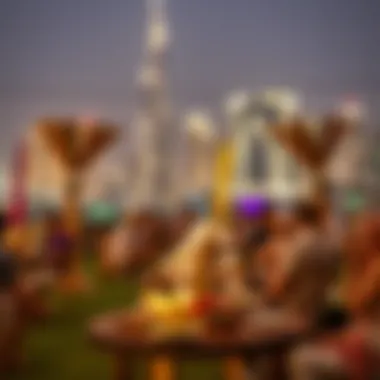
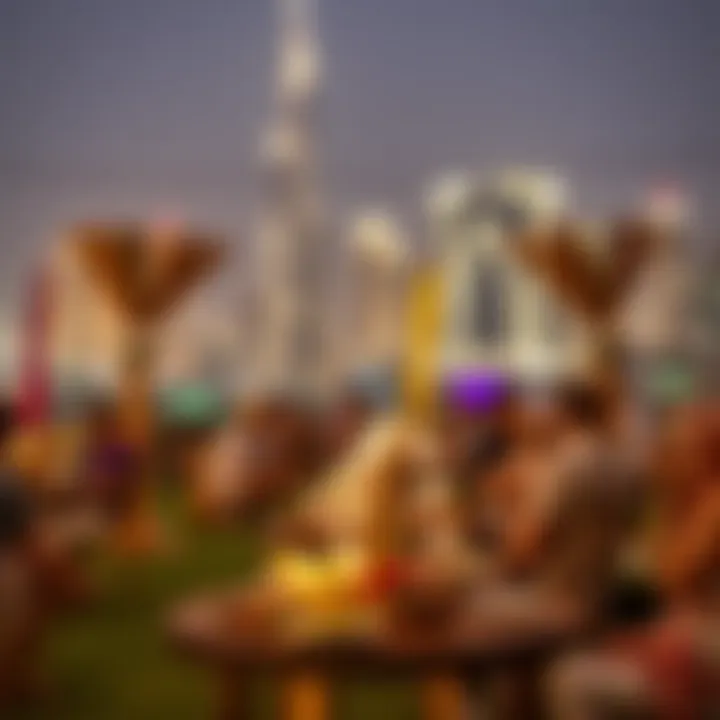
Virtual Iftar Events
As technology permeates our lives, virtual iftar events have gained traction, creating unique ways for people to connect during Ramadan. Families and friends spread across continents can now break bread together — albeit in a digital form. Invitation links are sent out, often accompanied by recipes, allowing participants to prepare the same meal.
Platforms like Zoom and social media channels are abuzz with various organized events, ranging from famous chefs offering cooking tutorials to themed discussions about the significance of Ramadan. These virtual gatherings ensure that cultural practices remain alive, even in the face of geographical barriers. They also accommodate those with unique dietary needs or busy schedules, offering a flexible way to participate in the rituals of iftar as families gather from their respective locations.
"Iftar is not merely about the meal; it signifies a time of connection, irrespective of where one might be."
The Culinary Landscape of Iftar
In Dubai, Iftar isn't just a meal; it’s a vibrant tapestry woven from cultural influences and culinary delights. This aspect of Ramadan sheds light on how diverse communities come together to celebrate not only the breaking of the fast but also the spirit of togetherness and hospitality. From sophisticated fine dining to humble, family-style gatherings, the culinary offerings during Iftar play a significant role in shaping the experience.
Traditional Dishes
Traditional dishes during Iftar in Dubai reflect the region's rich heritage and culinary practices. These meals often include offerings that are deeply rooted in history and cultural significance. Popular choices like Luqaimat, a sweet dumpling drizzled with date syrup, and Harees, a wheat and meat dish, highlight age-old recipes passed down through generations. These dishes are not just food; they evoke memories and emotions associated with family gatherings.
Moreover, soup plays an important role in the meal. For instance, Shorbat Adas, or lentil soup, is a staple that warms the heart after a day of fasting. Eating these traditional dishes fosters a sense of belonging and reminds the community of their shared values.
Innovative Twists on Classics
With Dubai's cosmopolitan environment, many chefs are reimagining traditional recipes, adding contemporary flair while honoring culinary roots. Picture saffron-infused briyani topped with pistachios or a fusion dessert that combines Arabic and Western techniques. As visitors delve into Iftar menus, these creative renditions not only tantalize the taste buds but also encourage diners to explore flavors they may not typically associate with the original dish.
Restaurants like Al Fanar or Zahrat Lebnan showcase how the culinary landscape is evolving. Chefs trade ancient cooking methods for modern presentations, merging textures and flavors seamlessly. Embracing these changes during Iftar reveals how tradition can coexist with innovation, making every meal an exploration of new tastes while still reflecting old customs.
The Role of Dates
Dates hold special significance during Iftar, serving as the quintessential food to break the fast. These small, often sweet fruits provide a quick energy boost after hours without food and water. The practice of breaking the fast with dates is rooted in the traditions of the Prophet Muhammad, further embedding their importance in Islamic culture.
Typically, varieties like Medjool and Ajwa are favored, each with its unique taste and texture. Some people prefer dates stuffed with nuts or wrapped in bacon for a savory contrast, whereas others enjoy them plain.
In Dubai, you'll find dates incorporated into various dishes, such as date smoothies or even date-infused biryani. Their versatility transcends mere consumption; they symbolize fertility and prosperity, strengthening community bonds as people come together to share their love for this fruit.
"Dates aren’t just a food; they are a means of connecting with the past and celebrating the present."
The culinary landscape of Iftar in Dubai continues to flourish, marrying tradition with innovation. Each dish tells a story, and every shared meal solidifies friendships and cultural ties among residents and visitors alike.
Popular Venues for Iftar Today
When it comes to Iftar in Dubai, its venues play a vital role in shaping the experience. From lavish settings to cozy corners, the choice of location can greatly enhance one's evening during Ramadan. The diversity in dining establishments reflects the multicultural tapestry of the city, catering to various tastes and preferences, while providing an opportunity for social interaction and community bonding.
Fine Dining Restaurants
In the realm of fine dining, Dubai is home to several prestigious restaurants that offer a luxurious Iftar experience. Dining establishments like At.mosphere, located on the 122nd floor of the Burj Khalifa, serve up a stunning view alongside an extravagant buffet of traditional Emirati and international fare. Here, guests can savor delicacies such as grilled lamb, stuffed vine leaves, and gourmet desserts while gazing out across the iconic skyline.
Another standout is Al Naseef, known for its contemporary twist on authentic Arabic cuisine. The ambience is often enhanced with live Arabic music, creating an inviting atmosphere that draws in both locals and visitors. Fine dining restaurants often prioritize unique, high-quality ingredients and exquisite presentations, turning the act of breaking the fast into a memorable culinary journey.
Casual Dining Options
For a more laid-back experience, casual dining spots present an appealing alternative. Restaurants like Zaatar w Zeit and Karachi Kitchen give guests a chance to enjoy a hearty Iftar without breaking the bank. Here, you can indulge in comforting dishes like zaatar manakish or flavorful biryanis, keeping the communal spirit alive without all the frills.


Casual venues often foster a relaxed environment where families and friends gather to share meals. The relaxed atmosphere helps to create a sense of belonging and community, allowing diners to engage in conversations and share stories over their favorite dishes. It’s not just about food; it’s about connection.
Community Iftar Tents
During Ramadan, community Iftar tents emerge throughout Dubai, emphasizing the spirit of togetherness. These pop-up tents are often set up in public parks, mosques, or other community spaces, welcoming everyone regardless of background. They offer a simpler menu that typically includes dates, lentil soup, and bread, embodying the essential elements of Iftar.
Within these tents, you might find people from various walks of life sharing meals and stories, fostering understanding and friendship. These community gatherings take on a life of their own, promoting inclusivity and cultural exchange. For those looking to connect with locals, participating in a community Iftar is an invaluable experience, rich in flavors and interactions.
"Iftar is not just a meal; it’s a moment of reflection and a celebration of community."
In summary, whether you seek the elegance of fine dining, the comfort of casual eateries, or the communal experience of an Iftar tent, Dubai has a venue to match your needs. The diversity of location and experience present during Ramadan fosters a deeper appreciation of the traditions tied to Iftar, making it an essential part of the holy month.
Navigating Dietary Considerations
Navigating dietary considerations during Iftar in Dubai is crucial, not only to accommodate religious practices but also to cater to the diverse needs of a multicultural population. As the sun sets and the call to prayer resonates, a wide variety of meals emerge. This moment is not just about enjoying food; it's also about inclusivity and understanding the different dietary needs that prevail in a cosmopolitan city like Dubai. Recognizing these considerations enriches the communal experience and honors the spirit of Ramadan.
Halal Practices
Halal practices are at the core of the culinary scene during Ramadan in Dubai. For many Muslims, adhering to halal guidelines is essential. This means that the food must be prepared according to Islamic law, ensuring it is not only permissible but also healthy and nourishing. Most restaurants in Dubai take pride in offering halal options, showcasing a range of meats, seafood, and vegetarian dishes that meet these standards. Vendors make certain to cater to these practices, often prominently displaying halal certifications.
The preparation of meals follows strict guidelines. This ranges from the sourcing of the ingredients to the manner of slaughter. For instance, a lamb dish typically enjoyed in Ramadan is prepared by ensuring the meat is certified halal, often sourced from trusted local suppliers. Break the fast with a dish like Mandi, flavorful rice served with tender chicken or lamb, which, besides being halal, resonates deeply with local culinary practices. Plus, halal-friendly eateries often post details about their ingredients to alleviate any concerns diners may have. This reassures everyone that they can celebrate and partake in Iftar with peace of mind.
Vegan and Vegetarian Options
In recent years, the demand for vegan and vegetarian options has surged, driven by a growing awareness of health and sustainability. Dubai's food scene has adapted to this trend, particularly during Ramadan. Many establishments now offer hearty and flavorful vegan and vegetarian dishes, ensuring that everyone can partake in the Iftar experience regardless of dietary preferences.
Options range from traditional foods like Hummus and Tabbouleh to innovative dishes like Falafel wraps, rich in spices and textures. One popular vegan dish is Koshari, a mix of lentils, rice, and pasta topped with a tangy sauce. Notably, several restaurants have begun to highlight their vegan options on their menus and are promising delightful experiences for non-meat eaters.
Here are some points to consider when it comes to vegan and vegetarian offerings:
- Diverse Choices: From Middle Eastern classics to Asian fusion, vegan and vegetarian Iftar dishes reflect a melting pot of cultures.
- Local Ingredients: Many chefs emphasize using seasonal, locally-sourced produce, enhancing the flavor and sustainability of their meals.
- Catering to Dietary Restrictions: Restaurants strive to accommodate various dietary restrictions, ensuring safety and inclusivity.
"Breaking bread is a universal tradition that transcends cultures and faith. In Dubai, every table at Iftar tells a story of connection and diversity."
As we reflect on the communal aspect of Iftar, understanding these dietary considerations becomes vital. It guides not just the culinary options that emerge at sunset but also the spirit of unity and community engagement that this holy month calls for.
The Social Aspect of Iftar
During Ramadan, the act of iftar transcends mere nourishment. It's a communal event brimming with social significance, stitching together the fabric of family, friends, and neighbors. In a city as diverse as Dubai, this aspect of iftar not only nourishes the body but also nurtures relationships, strengthening community bonds and fostering empathy.
Family Traditions
For many families, iftar is a cornerstone of Ramadan. It's that moment when the sun sets, and families gather around the table, eager to break their fast together. The air fills with the smells of rich stews, fragrant rice, and sweet desserts—culinary heirlooms passed down through generations.
Breaking bread together during iftar cultivates a sense of unity that resonates deeply in Dubai's multicultural milieu. Families often prepare traditional dishes that honor their heritage, such as haris or sambusas, inviting flavors from various cultures that coexist within the city. Not only does this practice keep traditions alive, it also encourages dialogue among generations, where stories of old are recounted over plates filled with food.
Moreover, the ambiance is key. Elders recite prayers, children eagerly await to taste the dates, and laughter fills the room. It’s a splendid reminder that amidst the hustle of modern life, the value of familial connections remains paramount. Most importantly, these gatherings are ripe with learning moments for the younger generation, who witness and participate in age-old rituals, keeping the circle of tradition alive.
Interfaith Iftar Gatherings
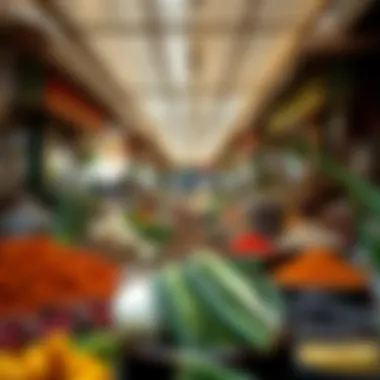
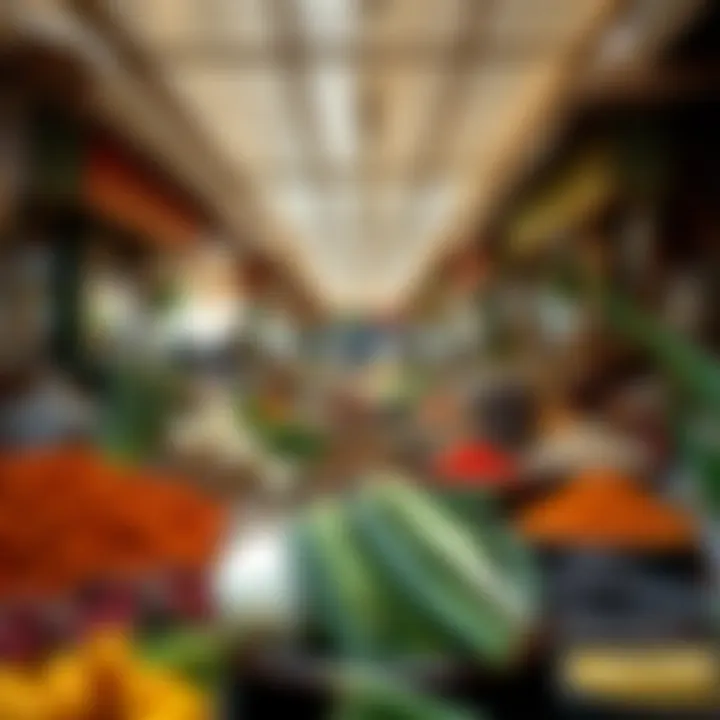
In a global city like Dubai, interfaith iftar gatherings have emerged as a beautiful testament to unity in diversity. Individuals from different faiths come together to share an evening meal, breaking barriers and fostering understanding. These gatherings epitomize the essence of community spirit, creating an inclusive environment where dialogues flourish.
Interfaith iftars vary in their approach, often hosted in community centers, mosques, or even private homes. Organizers make a conscious effort to incorporate dishes from different cultures, showcasing that food can be a universal language.
"Breaking fast together fosters mutual respect, understanding, and cooperation among different communities."
These events encourage attendees to share personal experiences and traditions, adding depth to the communal meal. They often begin with an overview of Ramadan's significance, then transition into the meal itself, creating avenues for rich conversations. Notably, interfaith gatherings contribute significantly to dispelling misconceptions about Islam and its practices, bridging gaps through shared experiences.
In summary, the social aspect of iftar embodies much more than food; it’s a chance for families to connect deeply and for communities to come together across different faiths. This communal sharing during the sacred month creates memories and friendships that last long after the month of Ramadan fades.
Reflection and Community Engagement
The observance of iftar during Ramadan extends beyond mere fasting and feasting; it's a deep-seated tradition that encourages reflection and cultivates a sense of community. In Dubai, where cultural intersections are blended into the very fabric of daily life, iftar emerges as a unifying event. It's a moment when diverse people converge, share meals, and partake in conversations that transcend differences, fostering a shared sense of humanity. As communities break their fast together, the spiritual and social aspects of iftar come into sharp relief, illustrating the importance of connection in a fast-paced urban landscape.
Charitable Initiatives
The month of Ramadan is synonymous with giving, and iftar is often where charitable initiatives take root in Dubai. Many organizations mobilize to provide meals to those in need, embodying the core values of generosity and compassion that characterize this holy month. Nonprofits and community groups, such as the Emirates Red Crescent, organize campaigns that distribute food packs to underprivileged families. Here’s how charitable actions unfold:
- Community Partnerships: Local businesses frequently collaborate with charity organizations, turning iftar into opportunities for giving back. Restaurants offer special menus, the proceeds from which go directly to charity.
- Food Drives: During this time, you might see initiatives aimed at collecting food items for donation, allowing the community to contribute ingredients that can help prepare meals for those less fortunate.
- Sponsor an Iftar: Many expatriates and locals take part in sponsorship programs, where groups or individuals fund iftar meals served in mosques and community centers, fostering inclusivity and goodwill.
All of these initiatives not only provide necessary sustenance but also create a dialogue around social responsibility, reminding everyone of the importance of sharing and caring, especially during such a sacred occasion.
Volunteer Opportunities
As iftar serves as a platform for charitable giving, it also opens numerous avenues for volunteers in Dubai. Individuals eager to give back often find themselves drawn into the spirit of community engagement through various opportunities:
- Serving Meals: Many organizations invite volunteers to assist in serving meals at community iftar gatherings or at shelters. This not only aids in feeding those in need but lets volunteers engage directly with the recipients, adding a personal touch to the experience.
- Food Preparation: Those with culinary skills can lend a hand in kitchen operations, helping to prepare the large quantities of food necessary for community events. It’s a great way to connect with others and learn traditional cooking techniques.
- Event Organization: Volunteers can also play crucial roles in organizing iftar events, from logistics to promotional efforts, ensuring that everything runs smoothly and that the spirit of Ramadan is upheld.
Involvement in these volunteer activities not only strengthens community bonds but also allows participants to reflect on their personal values and aspirations during this meaningful time.
Engagement in iftar – whether through volunteer work or participation in charitable schemes – fundamentally enriches one's Ramadan experience, galvanizing a culture of togetherness and compassion across Dubai.
Looking Ahead: The Future of Iftar
The future of iftar in Dubai is a crucial aspect of understanding how this age-old practice is evolving to meet the needs of a dynamic, multicultural society. As culinary traditions intersect with modern influences, iftar continues to reflect not only religious observance but also community identity and innovation. The following sections delve into emerging trends shaping iftar experiences in Dubai and explore how technology integrates into this cherished ritual, adding layers of convenience and connection.
Emerging Trends
In recent years, the landscape of iftar has undergone notable shifts, influenced by a variety of factors, including globalization and the changing demographics in Dubai. Here are several key trends defining the future of iftar:
- Health Conscious Options: With a growing emphasis on nutrition, many eateries are crafting menus that prioritize health without sacrificing flavor. You’ll see more fruits, lean meats, and whole grains surfacing in traditional dishes.
- Sustainable Practices: An increasing number of restaurants are focusing on sustainability, from sourcing local ingredients to reducing plastic usage. This trend resonates well with communities that value environmental responsibility.
- Fusion Flavors: The fusion cuisine movement is seeping into iftar menus. Imagine a shawarma taco or sushi rolls flavored with za’atar; these creative combinations allow people to experience familiar flavors in refreshing ways.
- Global Influences: Dubai's international flavor means iftar can now sometimes feature dishes that hail from various world cuisines. This blending of cultures not only serves diversity but also creates dialogue among communities.
Each of these trends signifies a shift towards a more inclusive, health-oriented, and environmentally aware approach to the breaking of fast.
Integrating Technology
As society becomes more intertwined with technology, iftar practices are also beginning to embrace digital innovations. The following elements highlight how technology plays a pivotal role in shaping future iftar experiences:
- Online Reservations: People can now easily secure their spots at popular iftar venues through user-friendly apps. This convenience also allows restaurants to manage capacity, ensuring a smoother experience for all visitors.
- Virtual Iftar Events: With recent global events leading to increased virtual interactions, many families have continued the trend of connecting online during iftar. Platforms such as Zoom enable loved ones afar to share meals together, fostering a sense of unity despite distance.
- Mobile Menus and Ordering: Restaurants are adapting by offering mobile menus where diners can browse and order their iftar meals from their phones. This is particularly handy for those who wish to grab something after a long day of fasting.
- Social Media Showcasing: Instagram and TikTok have become vital in promoting iftar offerings. Eateries are increasingly using social media to showcase their unique meals, encouraging word-of-mouth marketing that brings together community and commerce.
These technological integrations not only make for a more enjoyable iftar experience but also highlight Dubai's position as a leader in adopting modern conveniences while preserving traditional values.
“The fusion of tradition and innovation in iftar represents the spirit of Dubai—it’s about keeping the heart of customs alive while embracing the forward march of technology.”
The future of iftar in Dubai denotes a rich tapestry of culinary evolution and social bonding, cementing its place in the contemporary landscape as it continues to be a vital part of the Ramadan experience.







